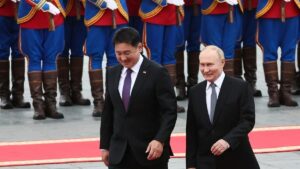ButSpeak.com
News which Matters.

Russian President Vladimir Putin’s visit to Mongolia proceeded smoothly despite an ICC arrest warrant, highlighting the complex international dynamics and Mongolia’s economic reliance on Russia.
Russian President Vladimir Putin’s state visit to Mongolia this week concluded without incident, despite the cloud of an International Criminal Court (ICC) arrest warrant that has loomed over him since March 2023. The visit, which was marked by red-carpet treatment and productive discussions on trade and bilateral relations, has sparked controversy due to Mongolia’s decision to ignore its obligations under international law.
Putin’s visit to Ulaanbaatar, where he met with Mongolian President Ukhnaagiin Khurelsukh, came at a time of heightened global scrutiny. As a member of the ICC, Mongolia was expected to arrest Putin upon his arrival, given the war crimes charges related to the unlawful deportation of children from Ukraine to Russia. However, Mongolia chose to sidestep this responsibility, opting instead to focus on strengthening its ties with Russia, a key economic partner.
During the visit, the two leaders signed several agreements, including those related to energy supplies, the reconstruction of a power plant, and environmental protection. These deals underscore Mongolia’s reliance on Russian investment and resources, particularly in the energy sector, where Russia is a crucial supplier of oil and gas. Additionally, Mongolia’s geographic position makes it a vital link in the planned gas pipeline that will connect Russia with China, further deepening its economic interdependence with its powerful neighbor.
The Kremlin was quick to highlight the success of the visit, using it as an opportunity to downplay the significance of the ICC warrant. Kremlin Press Secretary Dmitry Peskov dismissed the idea that institutions like the ICC could hinder Russia’s diplomatic relationships, particularly with what he termed the “global majority”—countries that remain interested in developing bilateral relations with Russia despite Western pressure.
“This whole story with the ICC … cannot and will not be a limitation in the development of Russia’s relations with partner states that are interested in developing bilateral relations and covering international contacts,” Peskov stated. He further emphasized that the global majority has a broader vision for international cooperation, contrasting this with what he described as the narrow focus of the ICC.
The visit has raised difficult questions for Mongolia, a country that finds itself balancing its international obligations with the practical realities of its economic and geopolitical situation. Analysts point out that Mongolia, which is economically vulnerable, was faced with a stark choice: comply with the ICC ruling and risk damaging its relationship with Russia, or ignore the warrant to secure its economic interests. Given its dependence on Russian energy supplies and the strategic importance of the planned gas pipeline, Mongolia’s decision reflects a prioritization of immediate economic needs over international legal commitments.
The fallout from this visit will likely continue to reverberate, as Ukraine and its European allies criticize Mongolia’s decision, and as the Kremlin continues to assert its diplomatic strategies despite international legal challenges.